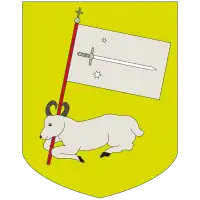Kaikhosro II Jaqeli
Kaikhosro II Jaqeli (Georgian: ქაიხოსრო II ჯაყელი; b. 1522 – d. 1573), of the House of Jaqeli, son of Qvarqvare III, was prince of Samtskhe (styled with the hereditary title of atabeg), ruling nominally in 1545–1573. Invested as a puppet ruler by the Ottomans in 1545, Kaikhosro II's tenure was marred by incessant Iranian–Ottoman rivalry, as well as uneasy relations with neighboring Georgian polities, and internecine feuds. The western part of his principality became quickly assimilated by the Ottomans and formed into a paşalık,[1] while the eastern part came under Iranian suzerainty. In 1570, as a result of continued Ottoman aggression, Kaikhosro was forced to seek direct assistance from his suzerain king Tahmasp I (r. 1524–1576) at the Iranian royal court, where he died three years later as well.
| Kaikhosro II Jaqeli | |
|---|---|
| Atabeg of Samtskhe | |
| Reign | 1545–1573 |
| Predecessor | Qvarqvare III |
| Successor | Qvarqvare IV |
| Born | 1522 |
| Died | 1573 Qazvin |
| Spouse | Dedisimedi |
| Issue | Qvarqvare IV Manuchar II Beka III (Sefer Pasha) Ivane the Fair-Eyed (tvalmshvenieri) Basil Mzetchabuk Elene Tamar |
| Dynasty | Jaqeli |
| Father | Qvarqvare III Jaqeli |
| Religion | Orthodox Christianity |
Biography
During the first decades of the 16th century, which were marked by political turmoil, the Samtskhe lords found themselves dispossessed of their territories.[2] Kaikhosro, then still an infant, was smuggled by Otar Shalikashvili to the Ottoman court at Istanbul in order to request help to reclaim his principality.[2] In 1536, the Ottoman army came, did nothing to help reinstate the atabeg, but went back with more loot than they could carry.[2] Subsequently, Samtskhe ceased to exist for a period of ten years — all of its lands were divided between Rostom Gurieli, Bagrat III of Imereti, and Luarsab I of Kartli.[2] At the same time, the Ottomans pursued an active policy of Islamisation in the southwest.[2]
In 1545, during the Ottoman-Safavid War of 1532-155, Samtskhe was under the attack of the main army of then incumbent Ottoman ruler Suleiman the Magnificent (r. 1520–1566).[3] Eventually, the Ottomans, assisted by Otar Shalikashvili, managed to overrun Samtskhe; Kaikhosro II was subsequently invested as a puppet atabeg by the Ottomans.[3] In the same year, Kaikhosro (then aged 22) married Dedisimedi, a Georgian noblewoman of the House of Mukhrani. Ottoman aggression in Samtskhe alarmed Kaikhosro II; he subsequently appealed to then incumbent Iranian Safavid king Tahmasp I to drive the Ottomans off, and to assist him in regaining Javakheti (ever since the Samtskhe principality was disbanded, it had fallen under the rule of Luarsab I).[3] In January 1547, Tahmasp I occupied the town of Akhalkalaki, despite a "severe winter", followed shortly by Javakheti and Lower Kartli.[3] The Iranian army, however, was "decimated" by Luarsab I's mercenaries, and shortly after by those of Bagrat III of Imereti and Levan of Kakheti (who helped Luarsab I).[3] Eventually though, both Bagrat III and Levan were paid off by Tahmasp I.[3]
Later in 1547, when the Ottoman threat flared up again, Tahmasp I summoned the kings of Imereti and Kakheti in order to secure tribute and military support from them.[3] Kaikhosro II ended up watching the western part of his principality being assimilated by the Ottomans and formed into a paşalık,[1] while the eastern moiety—where he preferred to stay—being subjected to Iran. The Ottomans would later periodically raid this eastern part of Samtskhe, which was under Iranian suzerainty; as a result, they managed to drive Kaikhosro in 1570 to the Iranian royal court at Qazvin, where he begged then incumbent king Tahmasp I to intervene.[1] Kaikhosro II died three years later, in 1573, at Qazvin.[4][1] He was succeeded by the eldest of his eight children with Dedisimedi, known by his dynastic name of Qvarqvare IV. However, since he was still young and inexperienced, the actual government of the country was taken over by his widow Dedisimedi and the nobleman Varaza Shalikashvili, whose sister was a favorite wife in king Tahmasp I's harem.[4]
Children
Kaikhosro II had eight children with Dedisimedi:
- Qvarqvare IV
- Manuchar II
- Beka III (converted to Islam and was named Sefer Pasha)
- Ivane the Fair-Eyed (tvalmshvenieri)
- Basil
- Mzetchabuk
- Elene
- Tamar
References
- Rayfield 2013, p. 175.
- Rayfield 2013, p. 168.
- Rayfield 2013, p. 169.
- Mamistvalishvili 2009, pp. 105–111.
Sources
- Mamistvalishvili, Eldar (2009). ""პატრონობდა დედისიმედი სამცხეს" (XVI ს-ის სამცხე-საათაბაგოს ისტორიიდან)" ["Dedisimedi patronized Samtskhe" (From the 16th-century history of Samtskhe-Saatabago)] (PDF). Proceedings of the Institute of Georgian History (in Georgian and English). IX: 105–111.
- Mikaberidze, Alexander (2015). Historical Dictionary of Georgia (2 ed.). Rowman & Littlefield. p. 379. ISBN 978-1442241466.
- Rayfield, Donald (2013). Edge of Empires: A History of Georgia. Reaktion Books. ISBN 978-1780230702.
